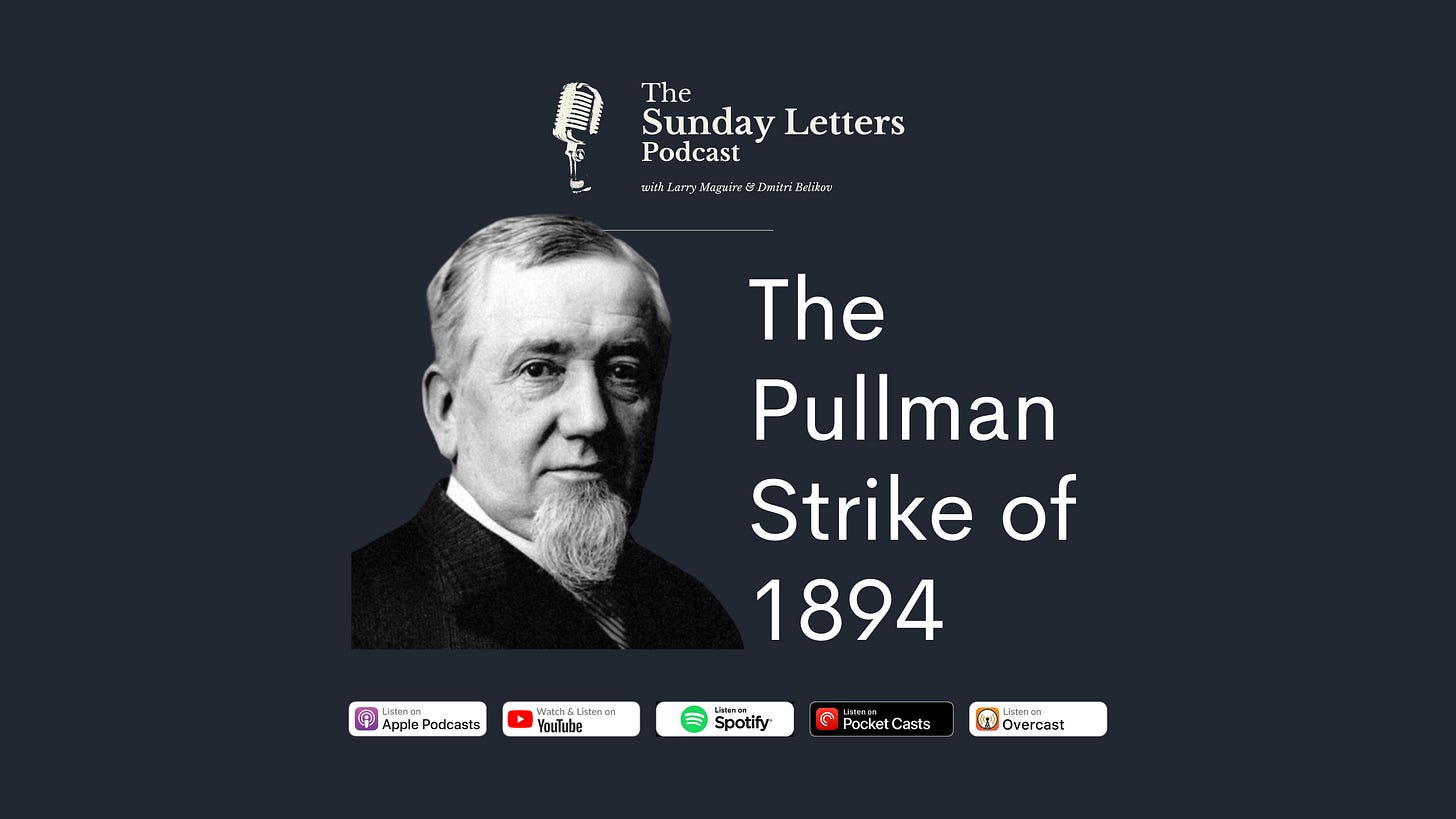Welcome to this week’s edition of the podcast. If you like what we’re doing, consider becoming a paid subscriber. If you’d rather not, you can offer a one-off tip here, or get yourself some merch here. Many thanks for your support!
Mark Twain referred to it as the Gilded Age. Given his wit and occasional cynicism, I’m not sure that was entirely in celebration of the growth and expansion of industrialisation in America at the time. It was a gilded age for some, such as the industrialists and capitalists, but not so much for the common worker. With the new “opportunities” that opened up for the people of the New World after the Louisianna Purchase of 1803, the next one hundred years would witness dramatic change and a conflict between the capitalists and the workers.
The Pullman Strike of 1894 is one of the most significant events in American labour history. It reflected the intense struggles between labour and management during this century of economic growth. This strike not only highlighted the harsh working conditions and economic disparities workers faced but also marked a pivotal moment in the development of labour unions and federal intervention in labour disputes.
George Pullman was a carpenter by trade from New York, who, in the 1850s, headed west to seek his fortune. He made his reputation raising houses and other buildings to the newly required street level. Later, he turned his hand to manufacturing luxury railroad sleeping cars that allowed wealthy passengers to travel in luxury from East to West. Pullman envisioned a utopian community for his workers, establishing the company town of Pullman, Illinois. This town included housing, shops, churches, and schools, all owned by the company. Pullman believed this controlled environment would foster loyalty and productivity among his workers.
However, Pullman’s paternalistic approach was viewed as overbearing and suppressed his workers’ freedom to direct their private lives. Workers were subjected to high rents and living costs, deducted directly from their wages. Despite the town’s apparent amenities, workers had little autonomy, and Pullman maintained strict control over their lives, including monitoring their behaviour and limiting their rights to free speech and assembly. Added to this was the pressure of competition on Pullman’s operations, which was passed on to workers in the form of layoffs and reductions in wages.
On May 11, 1894, facing pressing economic hardships and Pullman’s refusal to lower rents or discuss grievances, Pullman workers initiated a strike. The American Railway Union (ARU) led the strike, headed by Eugene V. Debs. The ARU, one of the largest and most influential labour unions of the time, sought to unite all railroad workers, regardless of their specific trade or skill level. The Pullman workers’ strike quickly gained support from other ARU members, leading to a nationwide boycott of Pullman cars. The boycott disrupted rail traffic across the country, severely impacting commerce and drawing national attention to the workers’ plight.
As the strike expanded, the railroads formed the General Managers Association (GMA) to counter the ARU’s efforts. The GMA, representing 24 railroad companies, sought assistance from the federal government, arguing that the strike disrupted mail delivery and interstate commerce, justifying federal intervention. President Grover Cleveland, under pressure from business interests and concerned about maintaining public order, responded by deploying federal troops to Chicago on July 3, 1894. Cleveland’s actions escalated tensions, leading to violent clashes between strikers and soldiers. Federal Marshals and state militia were found responsible for the deaths of thirteen people and seriously wounded fifty-three others. The intervention was deemed justifiable under the pretext of ensuring the movement of mail and protecting railroad property, but it effectively broke the strike.
The Pullman Strike of 1894 remains a crucial chapter in the history of American labour. It underscored the harsh realities of industrial capitalism and the lengths to which both employers and the government would go to maintain the status quo. However, it also galvanised the labour movement, inspiring future generations of workers to continue the fight for fair wages, reasonable working conditions, and the right to unionise. The strike’s legacy is evident in the eventual successes of the labour movement, such as the establishment of Labor Day as a national holiday in 1894, just months after the strike ended. This recognition of workers’ contributions marked a small but significant step toward acknowledging the importance of labour in American society1.
Ah, yes, but has anything really changed? Arguably, matters became worse in the proceeding hundred or more years. Workers still work at the behest of their employers, and worker rights were slowly but surely chipped away at, particularly so in the US, to the point now where wages have effectively stayed the same since the 1980s. As an illustration, here are two charts representing wage growth in the US and UK since 1974. Meanwhile, corporate profits and executive pay soar.


How do you feel about your work? Take the short survey.
Support Sunday Letters
Send us a Tip
Get some Sunday Letters merch
Subscribe on YouTube
References
Schneirov, R. (n.d.). The Pullman strike. Northern Illinois University Digital Library. https://digital.lib.niu.edu/illinois/gildedage/pullman












